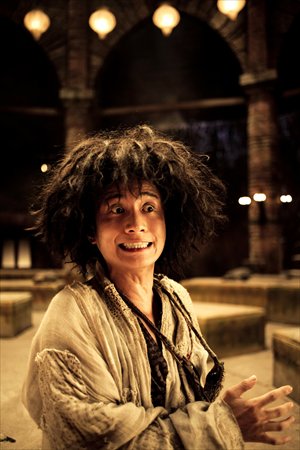Experimental 'Journey'

Stephen Chow conquers his demons with another box-office success
Earning over 220 million yuan ($35.04 million) at the box office in three days starting on February 10, Journey to the West: Conquering the Demons is a commercially and creatively triumphant comeback for Hong Kong filmmaker and actor-director Stephen Chow after a five-year hiatus following his children's hit movie CJ 7.
Good controversy
The plot of Conquering the Demons is very simple: Buddhist master Chen Xuanzang (Wen Zhang) learns to become an exorcist and subdues his three disciples who were once demons.
Though based on the Chinese ancient classic Journey to the West, a Ming Dynasty (1368-1644) novel written by Wu Cheng'en, Conquering the Demons is anything but a faithful adaptation.
The most notable change is main character Chen Xuanzang, who unlike the novel's serious and strong-willed Buddhist master, is a funny young man who doubts his belief and finds himself caught in a love affair. Chow also plays up the darker sides of the three disciples, which are often ignored in other TV and film adaptations.
Though his fresh take won applause from fans, the film also garnered criticism for its exaggerated portrayal of classic characters, some of which are even frightening to children.
Netizens also turned up the heat and accused Chow of copying scenes from the trailer of Japanese action video game Asura's Wrath.
"Starting from the 0:49 of the game's trailer, the scenes are exactly the same as those from when Sun Wukong confronts Rulai (the Tathagata)," Shanghai-based netizen "Jiliang Xiansheng" posted on Sina Weibo together with video of the trailer.
Movie critic Cui Ding later commented, "Conquering the Demons is good for its black humor, but compared with Chow's previous works like Shaolin Soccer (2001) and Kung Fu Hustle (2004), this is not among his best."
"The supporting roles are not that full and complete, for example," Cui said.
"But this time Chow is not under any pressure - he already is a box office draw," Cui added.
Personal touch
Stephen Chow has many faces: whether it is his comedic style of non-sequitur jokes (wulitou), his rags to riches story or his recent controversial foray into politics. Yet one of his most famous is that of the Monkey King in A Chinese Odyssey I: Pandora's Box (1994) and A Chinese Odyssey II: Cinderella (1994).
Directed by Jeffrey Lau, these adaptations of the classic novel Journey to the West earned praise from critics for their unique take on the stories, touching romantic plot lines and above all, Chow's exaggerated performance.
Now with Chow behind the camera, Conquering the Demons attempts to capitalize on the winning formula of the previous two.
Though Chow shifts focus from the Monkey King to monk Xuanzang, many of the plots and scenes are similar; the new film features a female protagonist chasing after a man who only realizes his feelings for her as she dies, delivering the same line, "I'd love you for 10,000 years if given a second chance."
Even the golden hoop worn by the Monkey King and the theme music are the same.
Chow has made his creative stamp visible throughout the film, something critics say is a deliberate move to impose his personality on the project despite not appearing on screen. For example, Chow is famous for using hoards of unattractive extras, and true to Chow's style, the whole movie from beginning to end is filled with a supporting cast and extras with thick eyebrows, buck teeth and other exaggerated features.
Also as a practitioner of kung fu, Chow heavily features martial arts in his films, and Conquering the Demons is no exception.
Rewriting a classic
Full of space for creative interpretation, the classics have provided a wellspring of blockbuster material for filmmakers in recent years; the fantasy-infused Painted Skin series (2008, 2012) is based on a short story of the same title by Qing Dynasty (1644-1911) writer Pu Songling, while romantic comedy It's Love (2011) pulls from the Chinese ancient folk story The Legend of the White Snake. Yet both films took a beating from critics. And while Pandora's Box and Cinderella have already been deemed "classics," the fate of Conquering the Demons is still uncertain.
Movie critic Cui Ding told the Global Times that It's Love offers nothing new in the way of plot lines, providing an ending even "kids can predict." "Giving audiences a twist ending is very important," he said.
By comparison, Pandora's Box, Cinderella and Conquering the Demons use classic tales as settings to tell new stories, a tactic that is much more attractive to audiences.
However, Cui also noted that a classic must stand the test of time. "When they were first screened, Pandora's Box and Cinderella also received a lot of criticism," he said.
"A professional attitude, respect for tradition and the ability to attract modern audiences are what it takes to [rewrite a classic]," said Li Zhong, a Kunming-based movie critic.
"[Pandora's Box and Cinderella] tell a modern love story by using an ancient one with a combination of fantasy, comedy and tragedy, while movies like Painted Skin series and It's Love lack a solid story line, and end up looking like a disordered pile of plot points," he added.